Cunyi Yin
An Interpretable Two-Stage Feature Decomposition Method for Deep Learning-based SAR ATR
Jun 11, 2025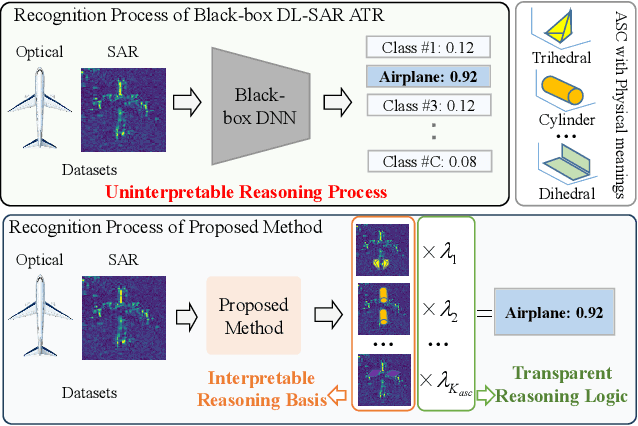
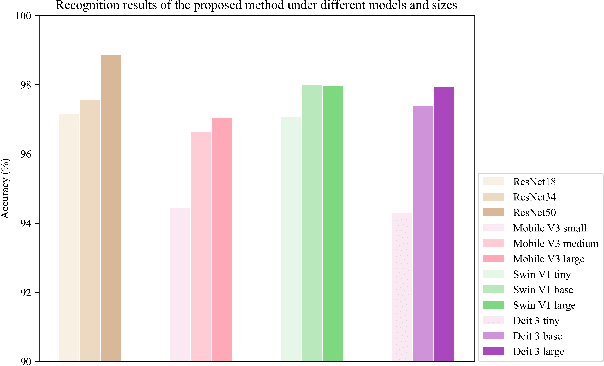
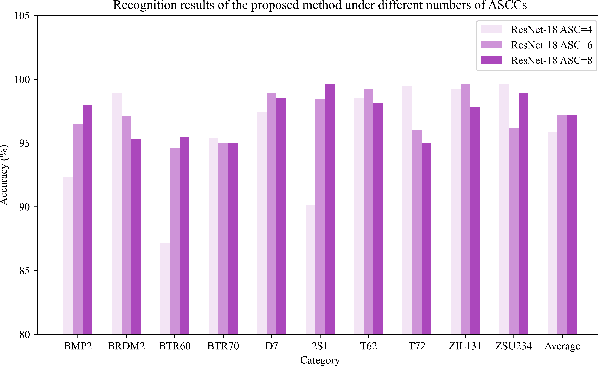

Abstract:Synthetic aperture radar automatic target recognition (SAR ATR) has seen significant performance improvements with deep learning. However, the black-box nature of deep SAR ATR introduces low confidence and high risks in decision-critical SAR applications, hindering practical deployment. To address this issue, deep SAR ATR should provide an interpretable reasoning basis $r_b$ and logic $\lambda_w$, forming the reasoning logic $\sum_{i} {{r_b^i} \times {\lambda_w^i}} =pred$ behind the decisions. Therefore, this paper proposes a physics-based two-stage feature decomposition method for interpretable deep SAR ATR, which transforms uninterpretable deep features into attribute scattering center components (ASCC) with clear physical meanings. First, ASCCs are obtained through a clustering algorithm. To extract independent physical components from deep features, we propose a two-stage decomposition method. In the first stage, a feature decoupling and discrimination module separates deep features into approximate ASCCs with global discriminability. In the second stage, a multilayer orthogonal non-negative matrix tri-factorization (MLO-NMTF) further decomposes the ASCCs into independent components with distinct physical meanings. The MLO-NMTF elegantly aligns with the clustering algorithms to obtain ASCCs. Finally, this method ensures both an interpretable reasoning process and accurate recognition results. Extensive experiments on four benchmark datasets confirm its effectiveness, showcasing the method's interpretability, robust recognition performance, and strong generalization capability.
CiUAV: A Multi-Task 3D Indoor Localization System for UAVs based on Channel State Information
May 27, 2025



Abstract:Accurate indoor positioning for unmanned aerial vehicles (UAVs) is critical for logistics, surveillance, and emergency response applications, particularly in GPS-denied environments. Existing indoor localization methods, including optical tracking, ultra-wideband, and Bluetooth-based systems, face cost, accuracy, and robustness trade-offs, limiting their practicality for UAV navigation. This paper proposes CiUAV, a novel 3D indoor localization system designed for UAVs, leveraging channel state information (CSI) obtained from low-cost ESP32 IoT-based sensors. The system incorporates a dynamic automatic gain control (AGC) compensation algorithm to mitigate noise and stabilize CSI signals, significantly enhancing the robustness of the measurement. Additionally, a multi-task 3D localization model, Sensor-in-Sample (SiS), is introduced to enhance system robustness by addressing challenges related to incomplete sensor data and limited training samples. SiS achieves this by joint training with varying sensor configurations and sample sizes, ensuring reliable performance even in resource-constrained scenarios. Experiment results demonstrate that CiUAV achieves a LMSE localization error of 0.2629 m in a 3D space, achieving good accuracy and robustness. The proposed system provides a cost-effective and scalable solution, demonstrating its usefulness for UAV applications in resource-constrained indoor environments.
Human Activity Recognition with Low-Resolution Infrared Array Sensor Using Semi-supervised Cross-domain Neural Networks for Indoor Environment
Mar 05, 2024Abstract:Low-resolution infrared-based human activity recognition (HAR) attracted enormous interests due to its low-cost and private. In this paper, a novel semi-supervised crossdomain neural network (SCDNN) based on 8 $\times$ 8 low-resolution infrared sensor is proposed for accurately identifying human activity despite changes in the environment at a low-cost. The SCDNN consists of feature extractor, domain discriminator and label classifier. In the feature extractor, the unlabeled and minimal labeled target domain data are trained for domain adaptation to achieve a mapping of the source domain and target domain data. The domain discriminator employs the unsupervised learning to migrate data from the source domain to the target domain. The label classifier obtained from training the source domain data improves the recognition of target domain activities due to the semi-supervised learning utilized in training the target domain data. Experimental results show that the proposed method achieves 92.12\% accuracy for recognition of activities in the target domain by migrating the source and target domains. The proposed approach adapts superior to cross-domain scenarios compared to the existing deep learning methods, and it provides a low-cost yet highly adaptable solution for cross-domain scenarios.
PowerSkel: A Device-Free Framework Using CSI Signal for Human Skeleton Estimation in Power Station
Mar 04, 2024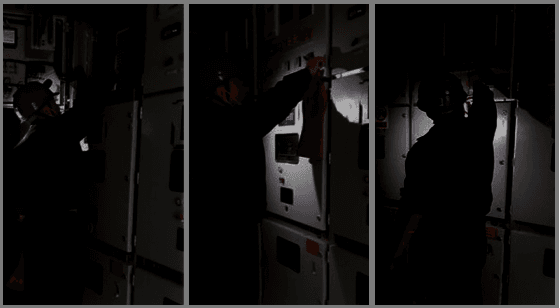
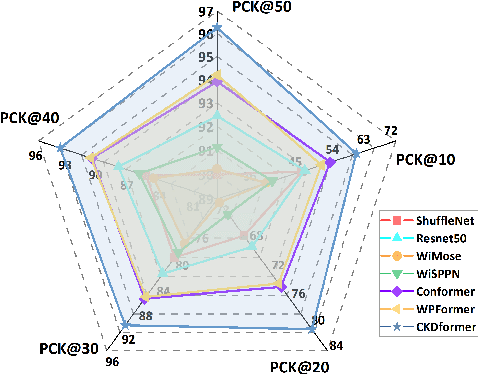
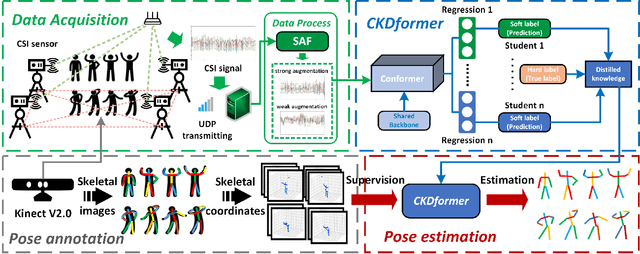

Abstract:Safety monitoring of power operations in power stations is crucial for preventing accidents and ensuring stable power supply. However, conventional methods such as wearable devices and video surveillance have limitations such as high cost, dependence on light, and visual blind spots. WiFi-based human pose estimation is a suitable method for monitoring power operations due to its low cost, device-free, and robustness to various illumination conditions.In this paper, a novel Channel State Information (CSI)-based pose estimation framework, namely PowerSkel, is developed to address these challenges. PowerSkel utilizes self-developed CSI sensors to form a mutual sensing network and constructs a CSI acquisition scheme specialized for power scenarios. It significantly reduces the deployment cost and complexity compared to the existing solutions. To reduce interference with CSI in the electricity scenario, a sparse adaptive filtering algorithm is designed to preprocess the CSI. CKDformer, a knowledge distillation network based on collaborative learning and self-attention, is proposed to extract the features from CSI and establish the mapping relationship between CSI and keypoints. The experiments are conducted in a real-world power station, and the results show that the PowerSkel achieves high performance with a PCK@50 of 96.27%, and realizes a significant visualization on pose estimation, even in dark environments. Our work provides a novel low-cost and high-precision pose estimation solution for power operation.
 Add to Chrome
Add to Chrome Add to Firefox
Add to Firefox Add to Edge
Add to Edge